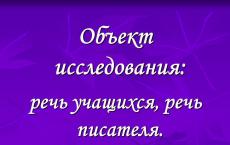Inner adult and inner child. Recipe for Strengthening the Inner Adult Relationships of Personal Positions
The formation of personality is a delicate process. First, an inner child thrives in us, then a reasonable and responsible adult appears. And only then the parent is born. The option is perfect. But what happens if, from a tender age, we are told to give up curiosity, spontaneity? They say that it's time to grow up, that is, to become like your parents. The result is that we are embarrassed by our inner world, we become isolated, we stop dreaming. Life turns into a painful exam, where you need to "fit". Laziness, fear and low self-esteem become our companions. The root of the problem is that the child has matured physically, but he jumped over the phase of the psychological "adult" and immediately became a strict "parent".
Echoes of childhood
"Child", "Adult", "Parent" are the three Ego states in which we are in different periods life. In "problem" families, a person develops only two states:
"child" - a person turns into a frivolous, irresponsible, insecure and unhappy;
"parent" - a person is constantly ready to teach, criticize, condemn, create strict limits, is overly self-critical.
What happens is that we find ourselves in a state where we block our development, become careless and are not ready to be responsible for our actions. The inner "adult" is able to analyze, make decisions, strive for a goal and plan his life.
What is it like to be an adult?
I understand that it is difficult to say whether your problems in life are related to the "lost adult". It is important to get an answer, because then we will find a vector along which we need to move further - we will get rid of internal conflicts. Harmonious "adult":
He learns to communicate with others, cooperates and accepts someone else's point of view. It is important to understand whether you have maintained a balance between the curious and spontaneous "child" and the reasonable "adult". Analyze, you often give orders, give orders, demand not to go beyond. Yes - you are a prisoner of a strict "parent".
Controls social behavior. An injured "baby" will easily justify any behavior. I drink, I do drugs because I am unhappy, deprived, etc. A strict "parent" will blame the system, the state and others for the troubles. "Adult" - analyze the situation, indicate objective reason non-standard behavior. For example, I am stressed, and therefore "I am aggressive."
Aware of the problem, always looking rational decision, analyzes the underlying causes. If the "child" is ready to invent, fantasize, then the "adult" knows how to implement all this and to embody his plans. A person goes through all stages of growing up, facing a problem and solving it.
Able to observe and analyze the state of the inner "I". A harmonious "adult" knows how to distance himself and see the problem without denying it, without forcing it out, without ignoring it. He is ready to admit defeat, accept the circumstances and start thinking about what can be changed. "Child" - will throw off the problem, start to rebel, run away. "Parent" - will shift the responsibility, find 100 reasons to justify it, fall into depression.
Can accept past experience, analyze mistakes and begin to form a new model of behavior. An "adult" is so stable that he is ready not to shift responsibility, but to look for solutions. It creates a new experience, taking into account the previous one. "Parent" - cannot create a new model based on the existing settings from childhood. "Child" - creates something new, but never draws conclusions from the past.
He knows how to assess the situation, while being flexible in his judgments and behavior. Acceptance of an alternative scenario is the main advantage of an "adult". He does not go to extremes, he is ready to reconsider life path to abandon imposed stereotypes. Accepts the point of view of others, if it is good for him. "Parent" - "either in my opinion, or not at all", "so true." "Child" - either everything is good, or everything is bad.
If, laziness, fear and low self-esteem haunt you, it's time to deal with internal conflicts. And what signs of "adult" you did not find in yourself?
What do you do with what has been done to you?
Jean Paul Sartre
Do we agree to give up the right to adulthood
just for the reason that they kept
archaic childhood vision of oneself and the world,
that needs to be protected with all his might?
What it's about - come on, guard that inner child
as it should be, just don't let him
take control of your adult life.
James Hollis
My deep conviction is that the goal of any work with a psychologist or psychotherapist is to acquire a new quality of life for a person and help him grow up adequately.
If a person has experienced deep childhood traumas, then the normal and natural course of his growing up is disturbed. And it is precisely for this that we need to look back, into our past, in order to get out of the captivity of our own childhood, to add to ourselves with the help of our inner parent what we once did not receive, and allow ourselves to live on. To grow up, you need to go through all the stages. Without a return to childhood and living what was not experienced, growing up is hardly possible. It seems to me that this is the way of growing up - it is to give love and acceptance, as well as satisfaction of the needs of our inner wounded child, to form the figure of an inner good enough inner parent; accept that our own parents were not perfect, listen to the desires of our inner child, and, as a result, be able to
build your relationships with others from an adult position.
Just as we have the figure of the Inner Child, the Inner Parent, we also have the figure of the Inner Adult, which is the figure that unites all subpersonalities. With the advent of the Adult, a person becomes whole.
In my opinion, an adult is characterized by the following qualities:
1. He understands and is aware of his needs and understands how and where, in a way that is safe for himself and others, he can satisfy them.
2. He does not shift his responsibility to others; one of his basic needs is to be the master of his own life. Being the master of our own life also means that we live our own life, and not the life of our parents or our children.
3. An adult respects his own feelings and thoughts, as well as the feelings and thoughts of others, and gives them the right to be different from him.
4. An adult person has such a quality as self-respect.
5. An adult is capable of making decisions. At the same time, he understands that these decisions may not please his loved ones.
6. He admits his vulnerability and gives himself and others the right to make mistakes.
7. An adult person accepts and recognizes his feelings and is capable of their healthy, mature expression.
So, in anger, throwing, yelling, throwing things around is usually an immature manifestation of a feeling of anger, anger can be experienced in different ways.
8. An adult is able to take care of himself. Often, when a client comes to me for a consultation, I ask: "How do you take care of yourself?" For some reason, the first thing I often hear as an answer is the following words: "Well, sometimes I go for a manicure, and I can also go to a cafe and have a cup of coffee before work." A manicure and a cup of coffee is wonderful. But taking care of yourself is not limited to this, and is far from only that. Sometimes it lies in the most elementary things, for example, in the fact that you have time to eat normally on time, and not always intercept something on the run. That you understand the signals of your body, and rest before you are ready to collapse from fatigue. The fact that you do not tolerate the flu and colds on your feet, performing labor feats, and give your body time to recover. This is also about taking care of yourself, and not just taking care of your body and applying makeup in the morning. In addition, self-care can also be attributed to the ability to ask for help when you realize that you yourself cannot cope with life's tasks. Seeking help from a psychologist or psychotherapist can also be attributed to this item.
9. An adult is realistic about himself, he does not strive to be perfect and perfect in everything.
10. An adult is able to give responsibility to the one who really deserves it. This point is closely related to point number two, but I decided to take it out separately. And here I would like to talk in more detail about our relationship with parents and about our parental role.
Some clients who come to me for consultations and groups feel as if they are traitors to their parents. As if they are "slandering" them that in fact there was nothing like that, that there are families where it is even worse - those in which parents are alcoholics or drug addicts who beat their children and mock them, which is even worse for some lucky - they grew up in an orphanage. Yes, admitting that something was wrong in our childhood is not easy enough. And at the same time, this is a necessary stage on the way to further progress. I usually answer clients: "If everything was so good for you, then why are you feeling so bad now?" I am a supporter of trusting my feelings and sensations. Sooner or later we will have to take our parents off their pedestal. To go through the stage of mourning for what was not in our childhood, to understand that our parents did everything in their power at that moment, that they themselves were not perfect people, that they also have a wounded child who is wounded inside them so much so that they are afraid to let their grown children go away from themselves. When you break away from your parents and begin to see them as ordinary people with their own problems and shortcomings, distortions in character, you do not betray them. In fact, by doing so, you give not only yourself, but also them a chance to grow up. Nobody else can do it for them. Perhaps this will be a somewhat exaggerated example, but do you allow someone else to eat instead of you? If someone eats your lunch for you, you will still feel hungry. It is the same with your parents - if you constantly do something for them (well, for example, fill the void in their lives after you have already started your own family, but are obliged to constantly come at the first request of your parents), you will don't fill the void anyway. Only they can do it.
It was not by chance that I included in the epigraph the words of Zh.P. Sartre "What do you do with what has been done to you?". Yes, it was - it is important to accept and mourn your past. But in order to have the strength to live on, and live with a different, healthier sense of self, we need to take responsibility for what we are doing now. It's unlikely to work otherwise.
And one moment. An adult understands that there are different situations. There are those where you can "release" your inner child, there are those where you can give voice (or not give voice) to your inner critic. And it is an adult who can live his own life.
Excerpt from "Healing the Inner Child"
In short, each person perceives himself from time to time as a Parent (for example - "I'm a clone of mom"), from time to time - as a Child (for example - "I need praise and comfort"), and from time to time - as an Adult. But there is an interesting point here: the perception of oneself as a Parent is colored emotionally: relatively speaking, this is the position of a bearer of moral norms, who has the right to judge and pardon, to allow and limit. The perception of oneself as a Child is also colored emotionally: no less conventional, it is a position of defenselessness and carelessness, desires and inclinations. But the position of the Adult has no emotions: again, relatively speaking, it is a computer, a calculating machine - without emotions, without moral norms, purely calculating actions and their consequences, choosing tactics and strategies in fulfilling the desires of the Child, sometimes - taking into account the opinion of the Parent.
That is why "feeling like an adult" in the position of an Adult is an oxymoron. You can feel yourself - confident, strong, etc. - but, paradoxically, these are just sensations from the position of the Parent or the Child. The perception of an Adult as a subpersonality is unemotional and logical: "I have 18 according to my passport? Yes. So, an adult. That's it."
When a person says about himself - "I am a capricious child" - this is not an assessment of the Adult. This, paradoxically, suggests that the inner Parent has loosened his belt, and substitutes moral norms instead of objective evidence (passport, etc.): like, "adults are not capricious." The Adult's job is to draw the Parent's attention to objective reality: to show oneself one's own passport, to remind oneself that objective observations of adults clearly show that they are doing what they want. If they want to be capricious, then they are capricious.
Fortunately, ideally - that is, in the case when a person really does exactly what he wants - there is simply nothing to be capricious about. The whims begin precisely when the desires of the inner Child are not fulfilled. The inner Adult should follow this: he is a calculating machine designed to fulfill these desires, he simply does not have his own desires. The calmer the inner Child, the more he is sure that the inner Adult will find a way to fulfill his desires - the more adequate the behavior of the person as a whole, and the less internal conflicts. In this sense, scolding yourself for whims is a bad tactic: you need to figure out where the whims come from and what the Child lacks, or what is superfluous for him so that he does not act up.
Thus, the recipe for strengthening the inner Adult is logic, logic, and again logic, which allows you to satisfy the needs of the inner Child, taking into account the requirements of objective reality. Since this is often forbidden by the inner Parent - the dialogue of the inner Adult with the inner Parent and the latter's persuasion.



